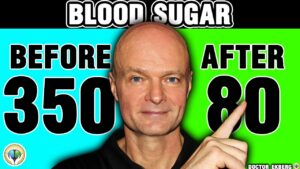In this video, the number one meal to clean out your arteries is revealed to be fasting. The video emphasizes that about 90% of doctors and many YouTube videos on the topic have an incorrect understanding of how arteries, plaque, heart attacks, and strokes are related. It discusses the misunderstandings of how plaque affects blood flow and how plaque can be cleaned out. The video then explores the real questions that should be asked, such as decreasing the risk of heart attack and stroke, finding out if one has soft plaque, and stabilizing it. The video also debunks seven common misconceptions about heart health and discusses food and supplement distortions. Finally, it highlights the importance of fasting for artery health and the impact it has on autophagy to clean out cells. The video concludes by emphasizing that artery health is a long-term lifestyle change rather than a one-time meal.

Our Summaries are written by our own AI Infrastructure, to save you time on your Health Journey!
**Key Insights:**
– The number one meal to clean out your arteries is actually fasting, as it triggers autophagy and reduces inflammation.
– Understanding the dance between arteries, plaque, and the risk of heart attack or stroke is crucial in addressing arterial health.
– LDL cholesterol is associated with cardiovascular risk, but other factors such as inflammation and insulin resistance play significant roles.
– Plaque in arteries gets stabilized rather than cleaned out, and the type of plaque (soft vs. stable) determines the risk of heart attack or stroke.
– Common misconceptions include the belief that fancy stents or bypass surgeries prevent heart attacks, the association between LDL and plaque as the only risk factors, and the idea that only older people need to worry about heart disease.
– Supplements like apple cider vinegar, vitamin K2, vitamin D, and niacin have varying levels of effectiveness and should be used with caution.
– Understanding and improving carb metabolism, reducing inflammation, and controlling insulin resistance are crucial in reducing the risk of cardiovascular events.
– The type of fasting (prolonged water fasting or intermittent fasting) depends on individual preferences and goals.
– Reshaping permanent eating habits is more important than one specific meal for arterial health.
– Clean arteries (free of plaque) are important to prevent cardiovascular events, as inflammation is the real danger.
Transcript
The number one meal to clean out your arteries may not be what you think. Many doctors and YouTube videos on this topic have gotten it wrong because they lack a fundamental understanding of how arteries, plaque, heart attacks, and strokes are related. So, can you actually clean out your arteries? And if so, how? These are some of the questions we’ll answer in this video.
Let’s start by addressing two major misunderstandings about clean arteries. The first misunderstanding is how plaque affects blood flow. Many people think that plaque clogs up arteries like hair in a drainpipe. However, arteries are flexible and can stretch, so it’s not a simple blockage. Plaque in arteries is more complex and dynamic than simple blockage.
The second misunderstanding is that plaque can be cleaned out. In reality, plaque gets stabilized rather than cleaned out. There are two types of plaque: soft and stable. Soft plaque is risky and inflamed, while stable plaque is much less risky.
Now, let’s move on to the four main questions we should be asking about artery health. The first question is, how can we decrease the risk of heart attack and stroke? To answer this question, it’s essential to understand how our bodies burn fuel and improve our body composition. Lab tests can provide insights into glucose tolerance, lipid fractionation, and inflammation markers.
The second question is, how can we find out if we have soft plaque? This is where the carotid intima-media thickness (CIMT) test comes into play. By measuring the plaque in the artery of our neck, we can get a good sense of our arterial health.
The third question is, if we have soft plaque, how can we stabilize it? This question can be answered by focusing on improving carb metabolism and reducing inflammation. Carb intake should be tailored to our body’s capacity to handle glucose, and resistance training can help build muscle and improve fat burning.
Finally, the fourth question is, do clean arteries actually matter? The answer is yes, as plaque in arteries is associated with an increased risk of cardiovascular events. However, it’s not just about having plaque-free arteries; it’s about reducing inflammation and maintaining overall arterial health.
Now, let’s address some common misconceptions. One misconception is that LDL cholesterol is the main indicator of cardiovascular risk. While LDL is associated with increased risk, correlation is not the same as causation. Factors like metabolism and insulin resistance play a significant role in heart health.
Another misconception is that only older people need to worry about heart attacks and strokes. In reality, plaque can start building up in arteries as early as five years old. It’s crucial to address artery health from a young age.
People also mistakenly believe that avoiding sugar means they don’t have plaque. However, foods like bread and pasta with high glycemic indexes can spike blood sugar levels, leading to inflammation and plaque formation.
There is also a common belief that cholesterol in plaque can be reversed. While inflammation can be reduced, reversing plaque is not as simple as scrubbing it away.
Stress tests are often seen as predictive of heart attacks, but they only measure cardiovascular fitness and are not foolproof indicators of future events.
Similarly, stents are thought to prevent heart attacks, but studies have shown that they are not as effective as believed. Stenting is more suitable for managing acute heart attack situations.
And finally, bypass surgeries are not necessarily a guaranteed way to prevent heart attacks either. This misconception comes from a misunderstanding of the complex nature of heart health.
Moving on to food and supplement distortions, there are several misconceptions to address. Apple cider vinegar and vitamin K2 are often touted as beneficial for artery health, but the evidence is mixed, and their impacts are not as significant as claimed.
Vitamin D and niacin are also commonly mentioned, but the evidence for their direct impact on artery health is limited.
So, what is the number one meal to clean out your arteries? It’s not about one specific meal but rather a lifestyle that focuses on overall artery health. Although certain foods like leafy greens, broccoli, and proteins can promote arterial health, it’s the long-term approach that matters.
Fasting is another key component in maintaining arterial health. It activates autophagy, which promotes cellular cleanup and reduces inflammation. Prolonged water fasting has the most significant impact, but intermittent fasting or time-restricted eating can also be beneficial.
In conclusion, to have clean arteries, it’s crucial to address inflammation, improve metabolic health, and maintain a balanced diet. It’s not just about one special meal but rather a lifestyle that promotes overall arterial health.





